Tools Required
Removal Procedure
- Disconnect the negative battery cable. Refer to
Battery Negative Cable Disconnection and Connection
in Engine Electrical.
- Drain cooling system. Refer to
Cooling System Draining and Filling
in Engine Cooling.
- Remove the intake manifold. Refer to
Intake Manifold Replacement
.
- Install the generator stud-ended bolt.
- Remove the exhaust manifold. Refer to
Exhaust Manifold Replacement
in Engine Exhaust.
- Install the J 28467-360
and J 28467-380
in order to support the engine.
- Remove the ignition coil and the module assembly to the camshaft
housing bolts. Remove the assembly by pulling it straight up. Refer to
Ignition Control Module Replacement
.
- Disconnect the camshaft position sensor connector.
- Remove the power steering pump. Refer to
Power Steering Pump Replacement
in Power Steering System.
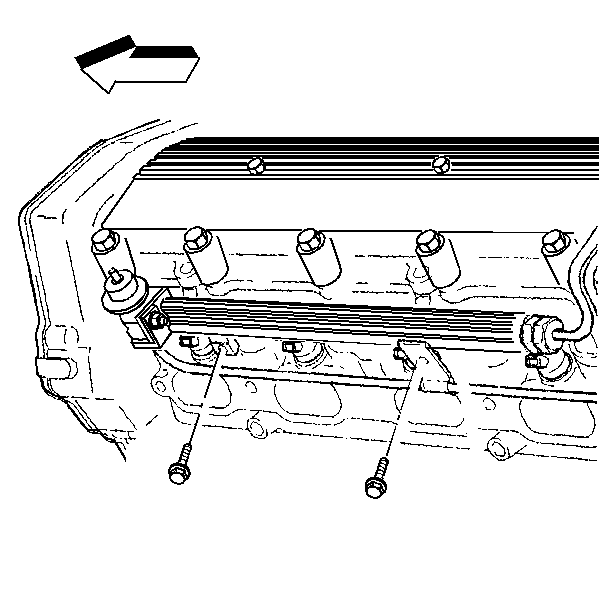
- Remove the fuel rail from
the cylinder head. Refer to
Fuel Injection Fuel Rail Assembly Replacement
in Engine Controls.
- Use the following procedure in order to remove the fuel rail from
the cylinder head:
- Disconnect the timing chain housing at the intake camshaft housing.
Do not remove it from the vehicle. Refer to
Timing Chain Housing Replacement
.
- Disconnect the electrical connection from the oil pressure switch.
- Remove the intake camshaft housing. Refer to
Intake Camshaft, Housing and Lifter Replacement
.
- Remove the exhaust camshaft housing. Refer to
Exhaust Camshaft, Housing and Lifter Replacement
.
- Disconnect the radiator inlet (upper) hose from the coolant outlet.
Refer to
Radiator Hose Replacement
in Engine Cooling.
- Remove the coolant temperature sensor connectors.
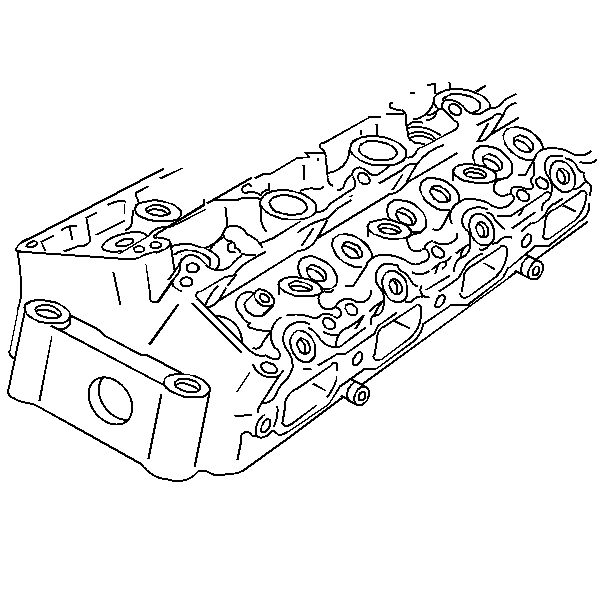
- Reverse the tightening
sequence shown in order to remove the cylinder head to block bolts.
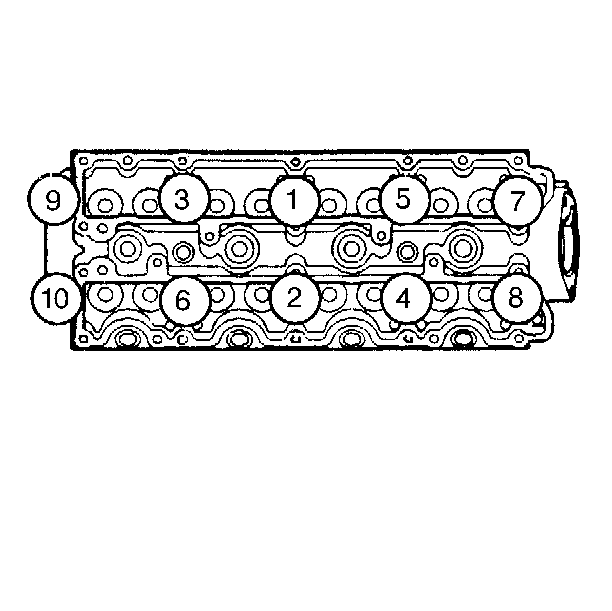
- Remove cylinder head and
gasket.
Notice: Engine damage may result if an abrasive paper, pad, or motorized wire
brush is used to clean any engine gasket surfaces.
Important:
| • | Use a razor blade gasket scraper in order to clean the cylinder
head and the cylinder block gasket surfaces. Do not gouge or scratch the gasket
surfaces or the combustion chamber surfaces. Use a new razor
blade for each cylinder head and the cylinder block. |
| • | Hold the gasket scraper so the blade is as parallel to the gasket
surface as possible. |
| • | The feel of the gasket surface is important, not the appearance.
There will be indentations from the gasket left in the cylinder head after
all of the gasket material is removed. These small indentations
will be filled in by the new gasket. |
| • | Do not use any other method or technique to clean the gasket surfaces. |
| • | Do not use a tap to clean the cylinder head bolt holes. Use a
nylon bristle brush. |
- Clean the old sealer/lube and dirt from the bolt, the studs, and the
bolt holes.
Clean the bolt holes with a nylon bristle brush.
Caution: Wear safety glasses when using compressed air in order to prevent eye
injury.
- When cleaning the cylinder head long bolt holes, use a suitable commercial
spray liquid solvent and compressed air from an extended-tip blow gun in
order to reach the bottom of the holes.
- Clean the following components:
| • | The cylinder head bolts. |
| • | Remove all the varnish, the soot, and the carbon to the bare metal. |
| • | Do not use a wire brush on any gasket sealing surface. |
| • | The remains of sealer from the plug holes |
Important:
| • | Do not remove the spark plugs from an aluminum cylinder head until
the cylinder head has cooled. |
| • | Clean the dirt and debris from the spark plug recess area. |
| • | If the spark plug opening threads are damaged and not restorable
with a Thread Chaser, use the thread inserts in order to repair the threads. |
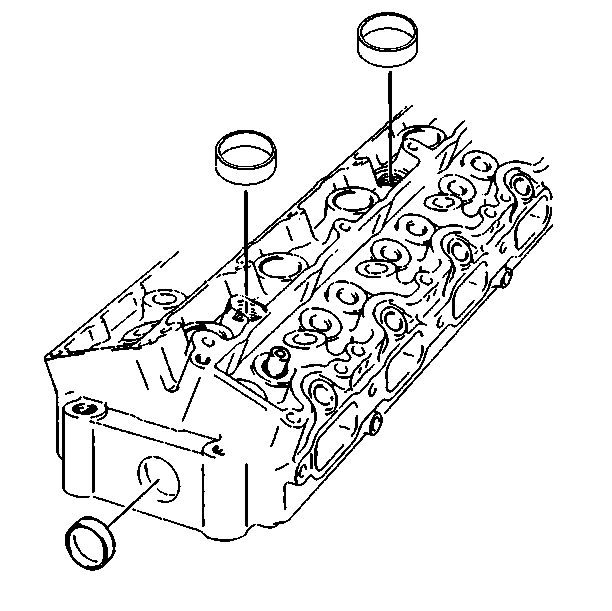
- Remove the spark plugs.
- Inspect the cylinder head bolts for damaged threads or stretching
and damaged heads caused by an improper use of tools.
Replace any suspected bolts.
- Clean and inspect cylinder head. Refer to
Cylinder Head Cleaning and Inspection
.
Installation Procedure
- If removed, install spark plugs.
- Install cylinder head gasket.
- Install cylinder head.

- Install cylinder head
bolts.
Notice: Use the correct fastener in the correct location. Replacement fasteners
must be the correct part number for that application. Fasteners requiring
replacement or fasteners requiring the use of thread locking compound or sealant
are identified in the service procedure. Do not use paints, lubricants, or
corrosion inhibitors on fasteners or fastener joint surfaces unless specified.
These coatings affect fastener torque and joint clamping force and may damage
the fastener. Use the correct tightening sequence and specifications when
installing fasteners in order to avoid damage to parts and systems.
Tighten
- Tighten bolts 1 through 8 to 65 N·m (40 lb ft).
- Tighten bolts 9 and 10 to 40 N·m (30 lb ft).
- Then turn all bolts an additional 90 degrees in sequence, using
the J 36660-A
.
- Connect coolant temperature sensor connector.
- Install intake camshaft housing. Refer to
Intake Camshaft, Housing and Lifter Replacement
.
- The exhaust camshaft housing. Refer to
Exhaust Camshaft, Housing and Lifter Replacement
.
- Install the timing chain housing and the timing chain. Refer to
Timing Chain Housing Replacement
.

- Install the fuel rail
to the cylinder head. Refer to
Fuel Injection Fuel Rail Assembly Replacement
in Engine Controls.
- Install the vacuum line to the fuel pressure regulator.
- Install the camshaft position sensor connector.
Important: When reinstalling the power steering pump apply a 3 mm bead of
GM P/N 12346586 sealer or the equivalent to the joint at the end of the camshaft
housing halves before installation of the power steering pump
and the pump face seal.
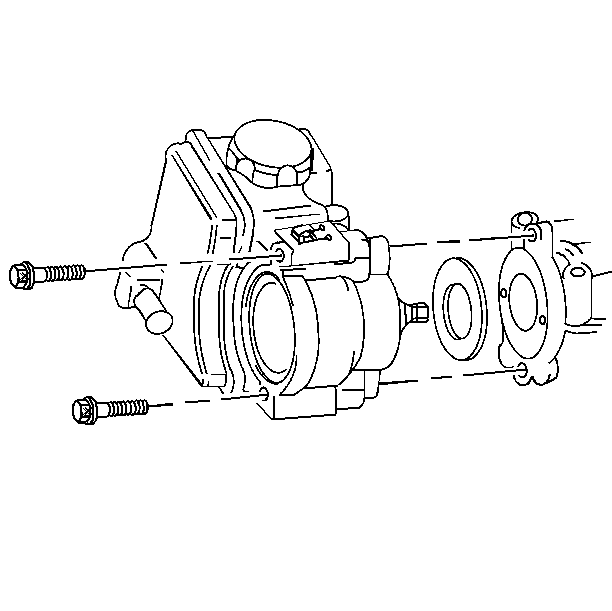
- Install the power steering
pump assembly. Refer to
Power Steering Pump Replacement
in Power Steering System.
- Install the electrical connection from the oil pressure switch.
- Reinstall any spark plug boot connector assembly that stuck to
a spark plug back onto the ignition coil and module assembly.
- Locate the ignition coil and the module assembly over the spark
plugs and push straight down.
- Clean any loose lubricant that is present on the ignition coil
and the module assembly to the camshaft housing bolts.
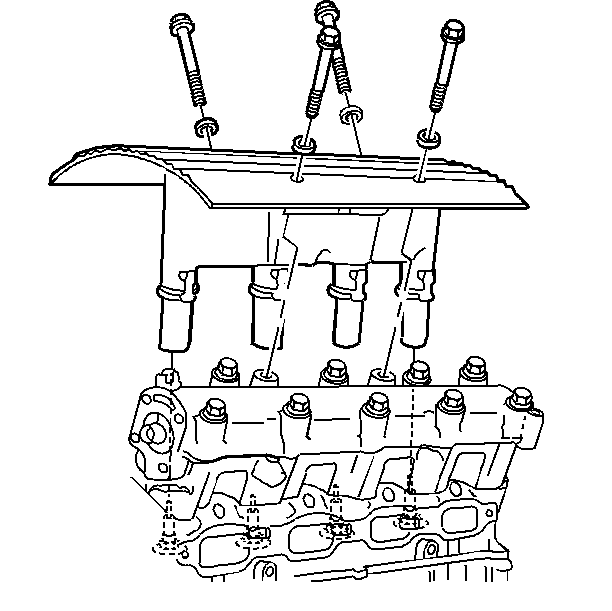
- Apply the Pipe Sealant
GM P/N 1052080 or the equivalent onto the ignition coil and
the module cover assembly to the camshaft housing bolts.
Tighten
Tighten the bolts to 15 N·m (11 lb ft) +
30 degrees.
- Install the electrical connector to the ignition coil and the
module assembly.
- Remove the J 28467-360
and the stud-ended generator bolt.
- Install the intake manifold. Refer to
Intake Manifold Replacement
.
- Connect the coolant temperature sensor connectors.
- Connect the upper radiator hose to the coolant outlet.
- Connect the following electrical connectors:
- Install the exhaust manifold. Refer to
Exhaust Manifold Replacement
in Engine Exhaust.
- Install the resonator and air cleaner duct.
- Fill the cooling system. Refer to
Cooling System Draining and Filling
in Engine Cooling.
- Connect the negative battery cable. Refer to
Battery Negative Cable Disconnection and Connection
in Engine Electrical.








